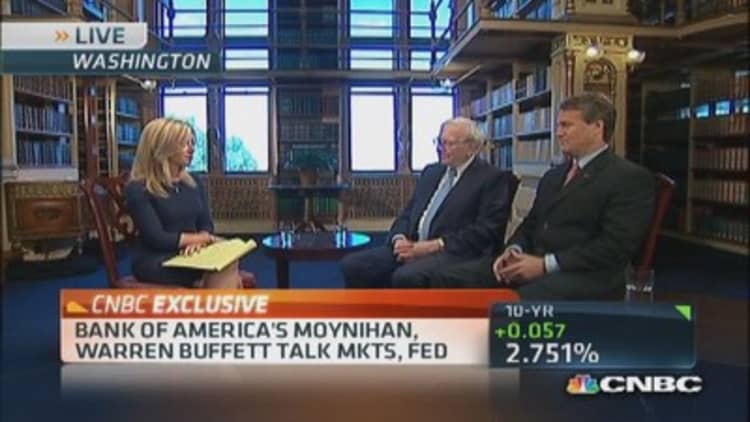Just when Wall Street thought the party was over, the Fed flipped the switch back on, leaving its easy money policy unchanged.
The sharp rally following the Fed's announcement Wednesday signaled a more positive time for risk markets ahead. Analysts say that, in general, the Fed's move should drive more gains for stocks, but the market will not be without its lumps in coming weeks, particularly as Congress wrangles over the debt ceiling. There is also the issue of a market that very quickly began to look overbought, with more than a quarter of the S&P 500 stocks surging to new highs Thursday.
(Read more: Buffett: Stocks now 'more or less fairly priced')
Stocks caught their breath after Wednesday's sharp race to new highs. The S&P 500 was down 3 points at 1722, while the off 40 at 15,636. The best performing sectors were tech, industrials and consumer discretionary.

Two widely-watched big investors weighed in on the stock market Thursday afternoon. Value hunter Warren Buffett told CNBC's Becky Quick that stocks have gone from "ridiculously cheap" to "more of less fairly priced now." He added, "We don't find bargains around but we don't think things are way overvalued either. We're having a hard time finding things to buy."
Investor Carl Icahn said on "Closing Bell" that the stock market is fully valued and that he's well hedged, but that Apple, a stock he owns, is undervalued. The S&P 500 is up 20.8 percent year-to-date and up 2 percent this week.
But even so, the Fed's move is helping stoke interest in stocks. "I think the [easier Fed policy] for longer does give more support to the global recovery, not only on the U.S. side but for emerging markets improving" said Oppenheimer Asset Management strategist Andrew Burkly. Burkly, head of institutional portfolio strategy, had focused on the materials sector as a contrarian trade weeks ago, but he said the Fed's move pushes that call to the main stream. Materials were one of the best performers of the major S&P sectors this week, with a gain of 2.7 percent.
(Read more: Pimco's El-Erian: 'Lots of opportunities' left)
"What the Fed is doing - easier for longer - weakens the dollar, or keeps it from really accelerating, and there's a good inverse relationship between the dollar and commodities," Burkly said.
Markets had been primed for a reduction in the Fed's $85 billion bond buying program, and most of Wall Street's firms and major banks had expected a $10-$15 billion reduction in monthly bond purchases. But when that did not happen Treasury yields initially moved lower and many risk markets rose. Gold rose 4.3 percent to $1369.30 from the time of the Fed announcement Wednesday to Thursday's settlement. Treasury yields did move up Thursday and the dollar made some gains. However, oil was lower, falling on what appears to be a warming of relations between the U.S. and Iran.
Legendary investor Stanley Druckenmiller, like others , said the Fed missed an opportunity to begin the long process of moving markets toward more normal rates but that should juice stocks.
"We're going into extra innings baby," Druckenmiller said on "Squawk Box." "The punch bowl was running out. It's just about dry, and two waiters just came in and they're carrying this new punch in. We're going to really party now."
The Fed said its reasons for keeping policy unchanged had to do with its concern about financial conditions and rising interest rates, particularly mortgages. It pointed at Washington and said fiscal uncertainty is also an issue.
(Read more: BofA got Fed right, here's what they say is next)
Burkly said in hind sight it's not surprising the Fed left policy unchanged, since it did cut its overly optimistic outlook for the economy.
Two economic reports were particularly strong Thursday. The Philadephia Fed survey showed a surprise jump in factory activity in its region to a two-year high, and existing home sales, a particular area of concern for the Fed, were at the highest level since February, 2007 in August.
"It's classic. Now that the data's getting better, they're lowering their forecast," Burkly said.
Burkly expects the S&P could be on a path higher, but it's not likely to go straight up. "The problem with the debt ceiling is it's kind of a moving target. Nobody really knows when we're going to hit it," he said, though the Treasury expects to hit it in October.
"I think as you get closer and closer, it will start wearing on the market," he said. But the market could move higher into the end of the year. "I could see us getting up closer to 1800 [on the S&P] by the end of the year, or early next year."
(Read more: Something else the Fed didn't taper)
Four Fed speakers Friday should get a lot of attention as investors continue to puzzle over the Fed. They are Fed Gov. Daniel Tarullo, who speaks at 12:40 p.m. on global financial services. Kansas City Fed President Esther George, the lone dissenter on the Fed, speaks at 12:30 p.m. on the economy in New York. St. Louis Fed President James Bullard speaks at the Harvard Club in New York at 12:55 p.m. on the economy. Minneapolis Fed President Narayana Kocherlakota speaks at 1:45 p.m. at a conference at New York University Stern School. ,
"At some point, we're going to have to come back to reality," said Jack Ablin, CIO of BMO Private Bank. "It's quite possible that the tapering of quantitative easing is off the table. If they're not going to do it in September, why would they do it in October" against the background of Washington budget battling?
"I think the Fed missed an opportunity…You can extend the party for a while, but the hangover just gets worse," he said.
—By CNBC's Patti Domm. Follow here on Twitter @pattidomm.


